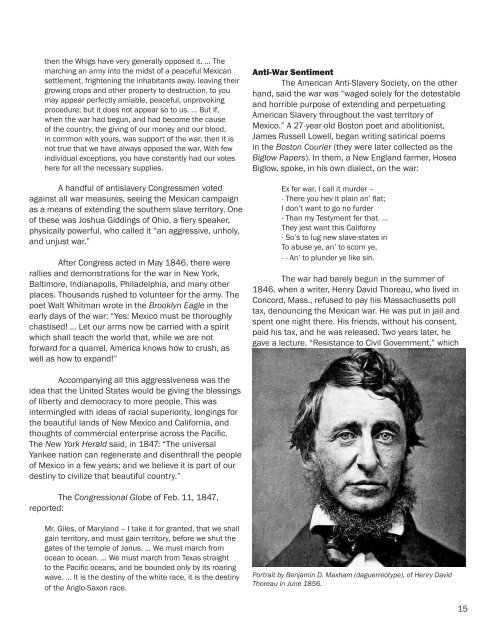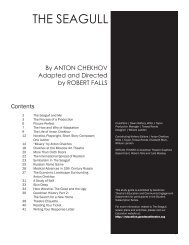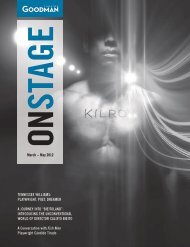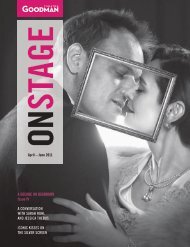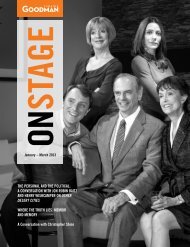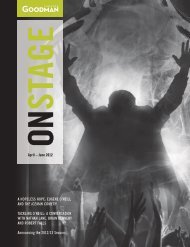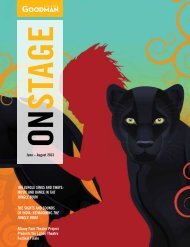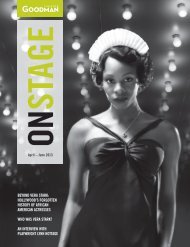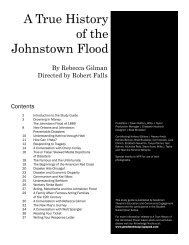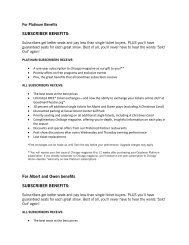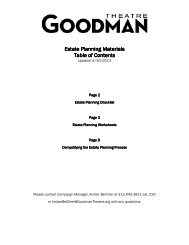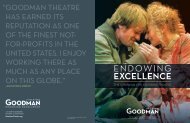El Nogalar Study Guide (9MB) - Goodman Theatre
El Nogalar Study Guide (9MB) - Goodman Theatre
El Nogalar Study Guide (9MB) - Goodman Theatre
You also want an ePaper? Increase the reach of your titles
YUMPU automatically turns print PDFs into web optimized ePapers that Google loves.
then the Whigs have very generally opposed it. … The<br />
marching an army into the midst of a peaceful Mexican<br />
settlement, frightening the inhabitants away, leaving their<br />
growing crops and other property to destruction, to you<br />
may appear perfectly amiable, peaceful, unprovoking<br />
procedure; but it does not appear so to us. … But if,<br />
when the war had begun, and had become the cause<br />
of the country, the giving of our money and our blood,<br />
in common with yours, was support of the war, then it is<br />
not true that we have always opposed the war. With few<br />
individual exceptions, you have constantly had our votes<br />
here for all the necessary supplies.<br />
A handful of antislavery Congressmen voted<br />
against all war measures, seeing the Mexican campaign<br />
as a means of extending the southern slave territory. One<br />
of these was Joshua Giddings of Ohio, a fiery speaker,<br />
physically powerful, who called it “an aggressive, unholy,<br />
and unjust war.”<br />
After Congress acted in May 1846, there were<br />
rallies and demonstrations for the war in New York,<br />
Baltimore, Indianapolis, Philadelphia, and many other<br />
places. Thousands rushed to volunteer for the army. The<br />
poet Walt Whitman wrote in the Brooklyn Eagle in the<br />
early days of the war: “Yes: Mexico must be thoroughly<br />
chastised! … Let our arms now be carried with a spirit<br />
which shall teach the world that, while we are not<br />
forward for a quarrel, America knows how to crush, as<br />
well as how to expand!”<br />
Anti-War Sentiment<br />
The American Anti-Slavery Society, on the other<br />
hand, said the war was “waged solely for the detestable<br />
and horrible purpose of extending and perpetuating<br />
American Slavery throughout the vast territory of<br />
Mexico.” A 27-year-old Boston poet and abolitionist,<br />
James Russell Lowell, began writing satirical poems<br />
in the Boston Courier (they were later collected as the<br />
Biglow Papers). In them, a New England farmer, Hosea<br />
Biglow, spoke, in his own dialect, on the war:<br />
Ex fer war, I call it murder –<br />
- There you hev it plain an’ flat;<br />
I don’t want to go no furder<br />
- Than my Testyment fer that. …<br />
They jest want this Californy<br />
- So’s to lug new slave-states in<br />
To abuse ye, an’ to scorn ye,<br />
- - An’ to plunder ye like sin.<br />
The war had barely begun in the summer of<br />
1846, when a writer, Henry David Thoreau, who lived in<br />
Concord, Mass., refused to pay his Massachusetts poll<br />
tax, denouncing the Mexican war. He was put in jail and<br />
spent one night there. His friends, without his consent,<br />
paid his tax, and he was released. Two years later, he<br />
gave a lecture, “Resistance to Civil Government,” which<br />
was then printed as an essay, “Civil Disobedience.”<br />
Accompanying all this aggressiveness was the<br />
idea that the United States would be giving the blessings<br />
of liberty and democracy to more people. This was<br />
intermingled with ideas of racial superiority, longings for<br />
the beautiful lands of New Mexico and California, and<br />
thoughts of commercial enterprise across the Pacific.<br />
The New York Herald said, in 1847: “The universal<br />
Yankee nation can regenerate and disenthrall the people<br />
of Mexico in a few years; and we believe it is part of our<br />
destiny to civilize that beautiful country.”<br />
The Congressional Globe of Feb. 11, 1847,<br />
reported:<br />
Mr. Giles, of Maryland – I take it for granted, that we shall<br />
gain territory, and must gain territory, before we shut the<br />
gates of the temple of Janus. … We must march from<br />
ocean to ocean. … We must march from Texas straight<br />
to the Pacific oceans, and be bounded only by its roaring<br />
wave. … It is the destiny of the white race, it is the destiny<br />
of the Anglo-Saxon race.<br />
Portrait by Benjamin D. Maxham (daguerreotype), of Henry David<br />
Thoreau in June 1856.<br />
15<br />
<strong>El</strong><strong>Nogalar</strong>.indd 15<br />
3/25/2011 4:05:38 PM


